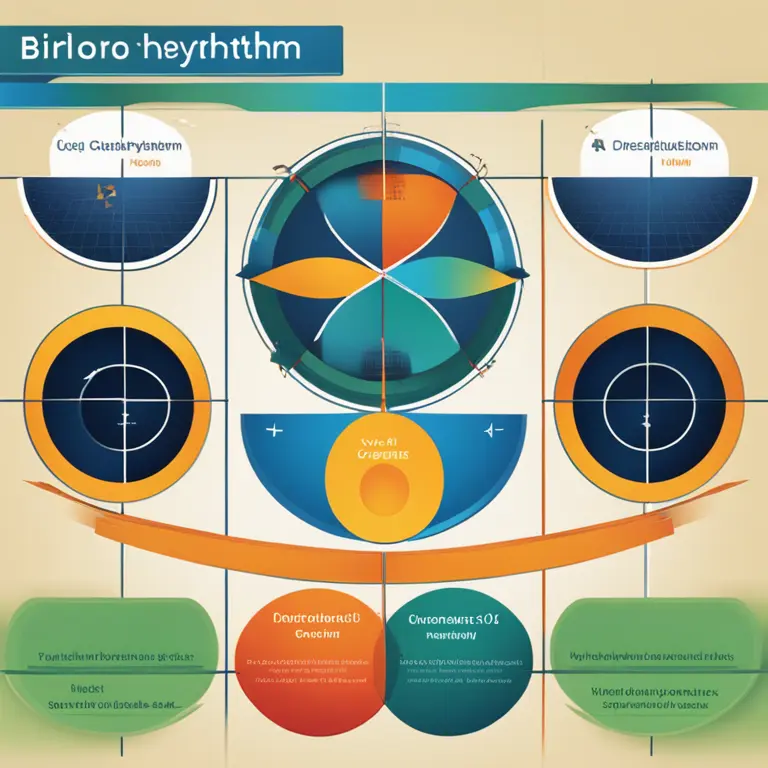
The Meaning of Biorhythm Compatibility in Relationships
Discover how biorhythm compatibility shapes dynamics in relationships and its impact on interpersonal connections.
article by Adrian Wallace
Introduction to Biorhythms
Biorhythms are believed to be the natural cycles of energy that regulate various aspects of our physical, emotional, and intellectual well-being. According to the theory of biorhythms, our lives move in predictable patterns, with each cycle reflecting a specific type of energy that peaks, declines, and then restarts. The concept originated in the early 20th century and has been a subject of interest for those who seek to understand the potential influence of these rhythms on their daily lives and their interactions with others.

What Is Biorhythm Compatibility?
Biorhythm compatibility is the study of how individuals' cycles align or conflict. It's the idea that our personal biorhythm cycles can affect how we connect and relate to others. By comparing the cycles of two people, it's thought that we can predict times of harmony or discord. It's used by some individuals in the context of relationships to explore whether partners are naturally "in sync" or may encounter periods of challenge based on their biorhythmic patterns.

The Three Cycles of Biorhythms
The primary cycles in biorhythm theory are the physical, emotional, and intellectual cycles. Each cycle has a different duration: the physical cycle lasts 23 days, the emotional cycle 28 days, and the intellectual cycle 33 days. When applied to compatibility, practitioners look at how these cycles align between partners to identify periods of shared highs or lows that may influence their relationship dynamics.

Calculating Biorhythm Compatibility
To calculate biorhythm compatibility, one must chart the individual rhythms of both partners and compare them. This involves determining the start date of each person's cycles—typically the birth date is used—and charting them over time. Various calculators and software are available in 2024, which streamline the process to provide a visual representation of the overlapping cycles and potential areas where partners harmonize or conflict.

Practical Uses in Relationships
Insights gained from biorhythm compatibility might be used to navigate challenges or enhance the quality of relationships. For instance, if partners are aware of a forthcoming period where their emotional cycles are out of sync, they might take proactive steps to communicate more deliberately or practice patience. This concept invites couples to be more mindful of timing and to use their knowledge of cyclic patterns to their advantage.
Critiques and Considerations
Despite some people's enthusiasm for biorhythms, the scientific community generally remains skeptical of their validity. There is a lack of empirical evidence to support the direct influence of biorhythms on relationships. As such, while some find value in biorhythm analysis as a personal or spiritual tool, it's important to consider its use as one of many ways to understand relationship dynamics, rather than a foolproof method.
The Future of Biorhythm Studies
As we advance into 2024 and beyond, the intersection of technology and personal wellness continues to grow, potentially bringing new developments in the analysis of biorhythms. There is continuous interest in holistic and alternative approaches to well-being, which may foster further innovation and discussion around biorhythms and their perceived effects on interpersonal relationships.
Published: 1/25/2024
Modified: 1/25/2024
More predictions
Come back here soon to learn more about yourself and your future


Your Biorhythm Horoscope Handbook
Discover the intriguing intersection of biorhythms and astrology. Learn how tracking your biological cycles can provide insights into your physical, emotional, and intellectual well-being.


The Principles of Biorhythm Cycles
Discover the fundamental principles of biorhythm cycles and how they influence daily life and personal well-being in this insightful article.


The Human Biorhythm Cycle: Patterns of Life's Ebb & Flow
Delve into the human biorhythm cycle, a compelling concept in the holistic understanding of our physiological and emotional patterns over time.